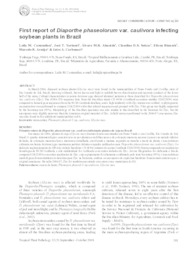First report of Diaporthe phaseolorum var. caulivora infecting soybean plants in Brazil.
First report of Diaporthe phaseolorum var. caulivora infecting soybean plants in Brazil.
Author(s): COSTAMILAN, L. M.; YORINORI, J. T.; ALMEIDA, A. M. R.; SEIXAS, C. D. S.; BINNECK, E.; ARAÚJO, M. R.; CARBONARI, J. A.
Summary: In March 2006, diseased soybean plants (Glycine max) were found in the municipalities of Passo Fundo and Coxilha, state of Rio Grande do Sul, Brazil, showing withered, brown leaves and light to reddish-brown discoloration and necrosis (canker) of the lower half of the stem. Cultural characteristics in potato dextrose agar showed identical patterns to those described for Diaporthe phaseolorum var. caulivora (Dpc). The rDNA-ITS sequence data from the Brazilian strain CH 40/06 (GenBank accession number EU622854) were compared to homologous sequences from the NCBI GenBank database, and a high similarity with Dpc strains was verified. A phylogenetic reconstruction was performed to compare EU622854 with other related sequences and grouped with Dpc. This group was highly supported by the bootstrap test (99%). Morphology of the Brazilian specimen was also similar to that described in the literature for Dpc, but the ascospores were slightly narrower than the American original material of Dpc. In field surveys performed in the 2006/07 crop season, Dpc was also found in five additional municipalities in RS.
Publication year: 2008
Types of publication: Journal article
Unit: Embrapa Soybean
Observation
Some of Embrapa's publications are published as ePub files. To read them, use or download one of the following free software options to your computer or mobile device. Android: Google Play Books; IOS: iBooks; Windows and Linux: Calibre.
Access other publications
Access the Agricultural Research Database (BDPA) to consult Embrapa's full library collection and records.
Visit Embrapa Bookstore to purchase books and other publications sold by Embrapa.

